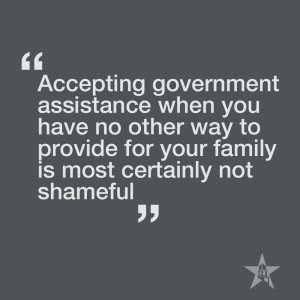2013: My senior year of high school. The year 45.3 million people were living in poverty. The year my family qualified for welfare. The year I was fully submerged in microaggressions when people realized I was poor.
‘College is really expensive, Dani.’ ’You know you’ll have to work, right? Students don’t get welfare.’ ‘Can you afford a school like that?’ Peers, teachers, and advisors thought they were just ‘looking out for me.’ They meant no harm, they were just trying to prepare me for the real world, right? Wrong. Every reference to my socio-economic status and recommendation for an ‘affordable community college’ was laced with an implied assumption of failure.
 Though the ‘American dream’ has been the motto for success, America was built by and for the privileged. While there may be some exceptions, most, if not all of our founding fathers were college educated, and from middle and upper class families. Society has continually changed, however, poverty has not. It has come to be seen as the black plague of modern America; the illness one no one wants to contract, yet so many are infected with.
Though the ‘American dream’ has been the motto for success, America was built by and for the privileged. While there may be some exceptions, most, if not all of our founding fathers were college educated, and from middle and upper class families. Society has continually changed, however, poverty has not. It has come to be seen as the black plague of modern America; the illness one no one wants to contract, yet so many are infected with.
One specifically horrific side effect of such an ailment includes the use of government assistance. People are so afraid of this symptom that they are going hungry to avoid it. They are ashamed, ashamed at the prospect of humiliation and judgment. Shame is defined as a painful feeling of humiliation or distress caused by the consciousness of wrong or foolish behavior. Poverty is not shameful; what is shameful is making people feel as though it should be. Defining who people are based on their socio-economic status is shameful. Treating the poor as if they are lepers is shameful. And accepting government assistance when you have no other way to provide for your family is most certainly not shameful.
 Recently I saw a photo that was supposed to be a comparison between the refrigerator in a middle class home and a jobless home. The fridge in the jobless home was filled to the brim with name brand foods and drinks. The middle class fridge, however, was nearly empty, containing just a few items. The sharing of this photo on social media and online forums contributes to the stream of stereotypes surrounding government assistance. These stereotypes provide perceived justification of microaggressions.
Recently I saw a photo that was supposed to be a comparison between the refrigerator in a middle class home and a jobless home. The fridge in the jobless home was filled to the brim with name brand foods and drinks. The middle class fridge, however, was nearly empty, containing just a few items. The sharing of this photo on social media and online forums contributes to the stream of stereotypes surrounding government assistance. These stereotypes provide perceived justification of microaggressions.
Poverty does not discriminate. Despite popular belief, it does not just affect the lazy, the drug addicts, or the alcoholics. America is a prideful nation, we do not like to admit failure. Poverty is perceived as failure; failure to succeed, failure to provide, and failure of fulfilling dreams. The constant reminder of failure through microaggressions is painful. Imagine if you needed a tutor to pass a class and people subtly reminded you on a daily basis that you needed someone else’s help in order to succeed. You would probably feel offended and hurt. This is exactly how people living in poverty feel when they’re subjected to microaggressions.
Poverty is not a disease. Poverty, like any trial presented in one’s life, is an opportunity to glorify God. The poor are not exempt from God’s love, so why does society treat them like outcasts? No more. No more shaming. No more reminders. No more judgment. Jesus did not avoid the poor, he did not cast them out, and he did not make them feel poorly about their financial status. He dined with them, he prayed with them, but most importantly, he loved them.
So be conscious of what you say. Words, judgements, and stereotypes can be sharper than knives, and just as damaging.
